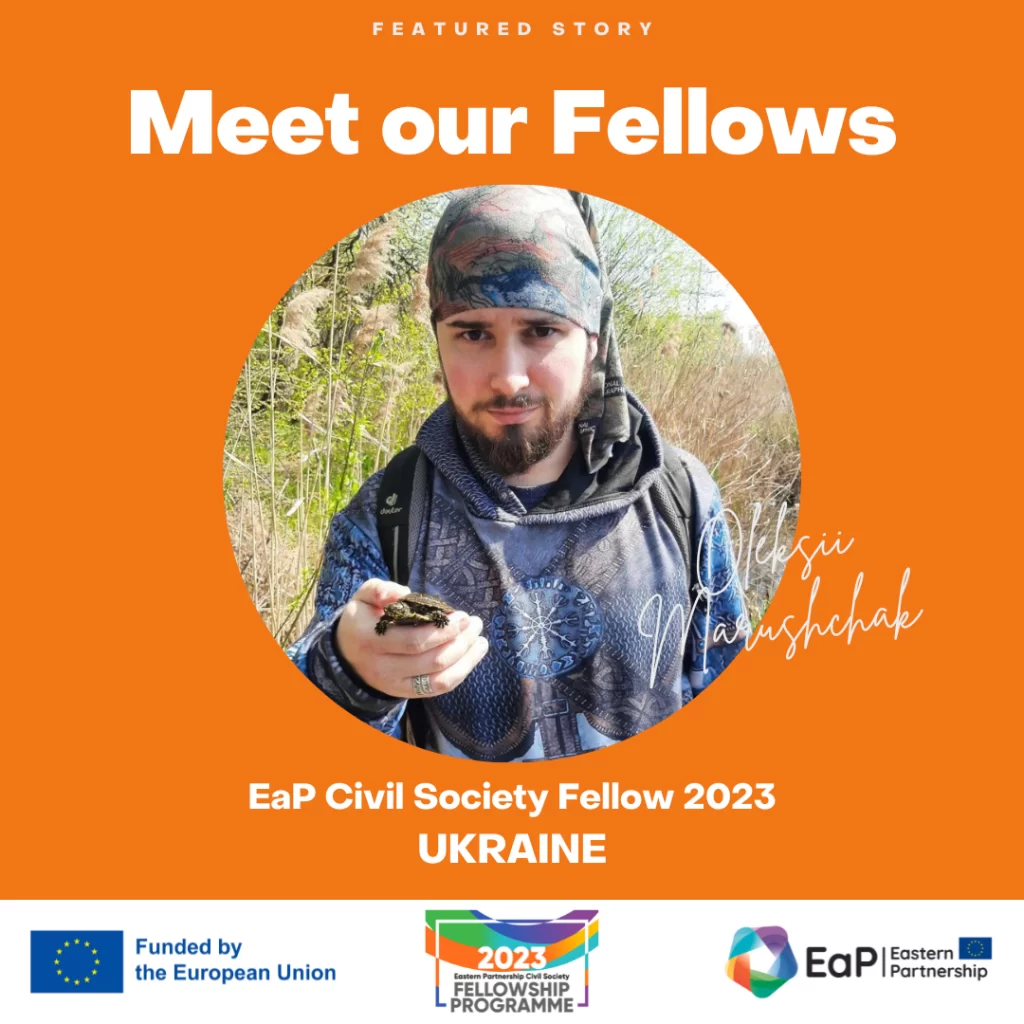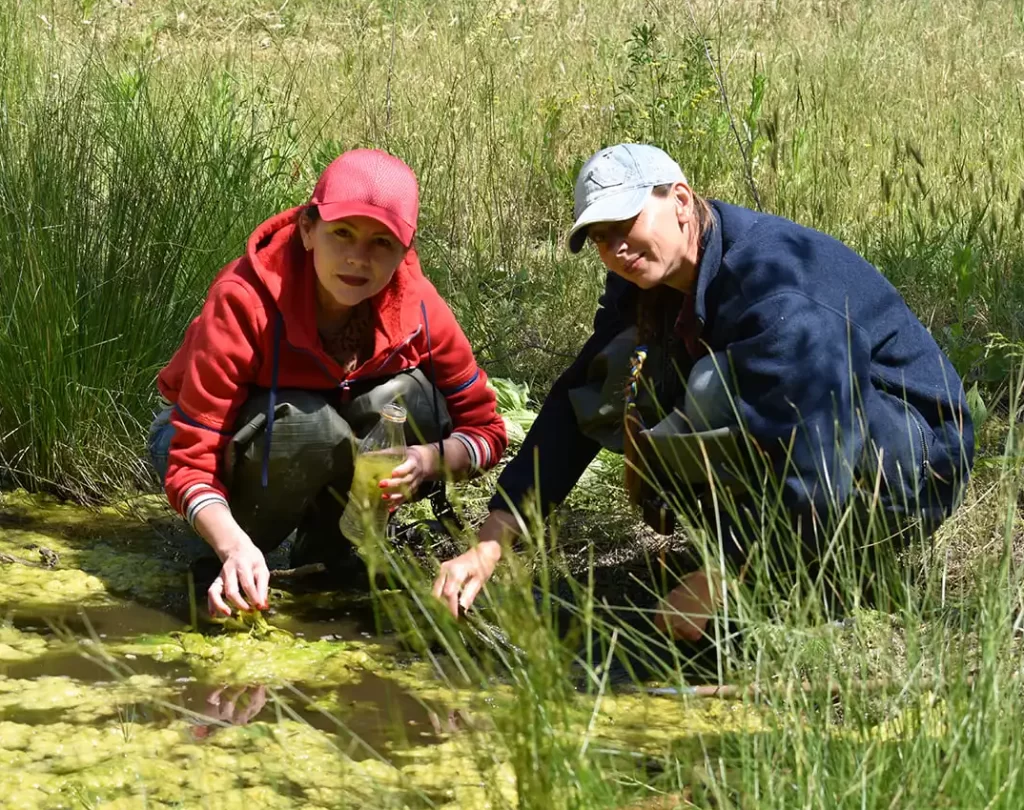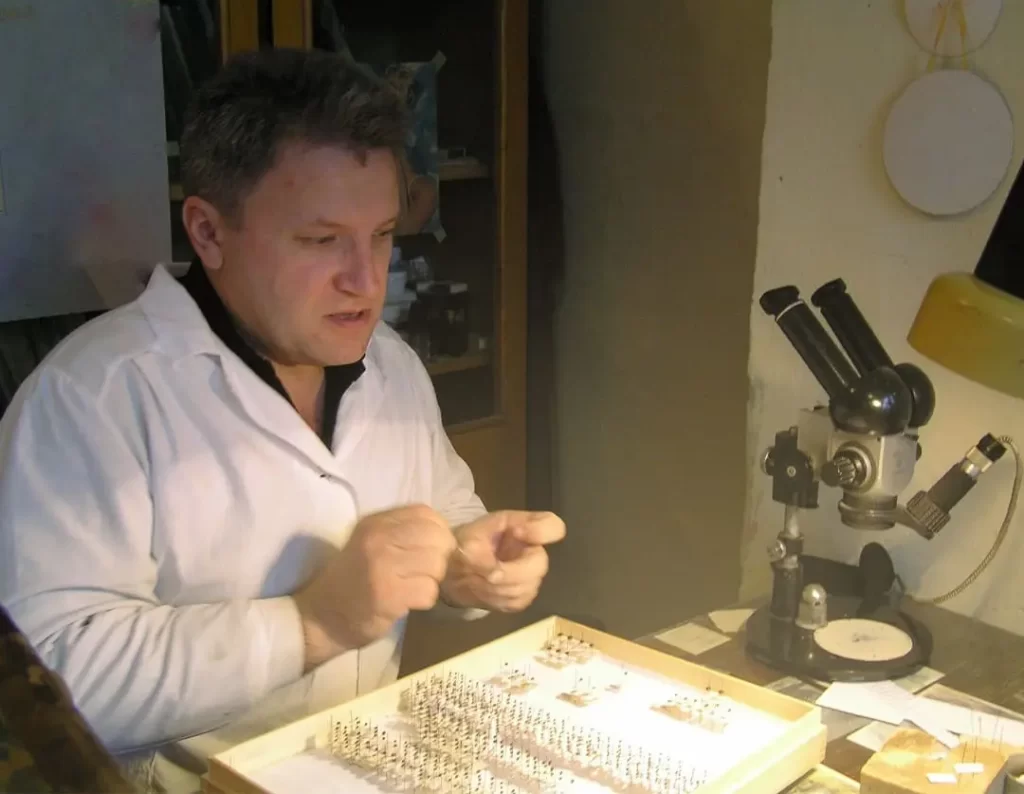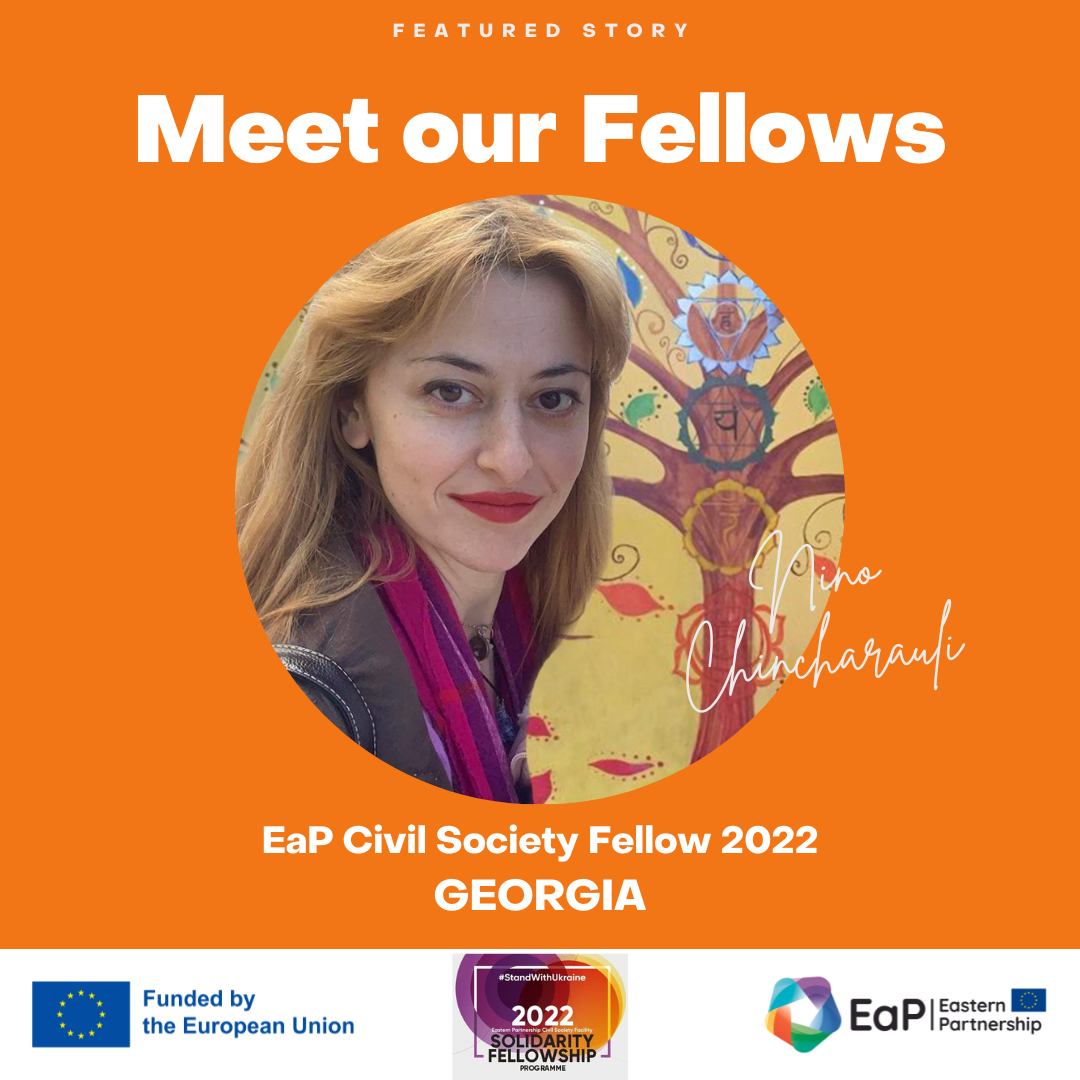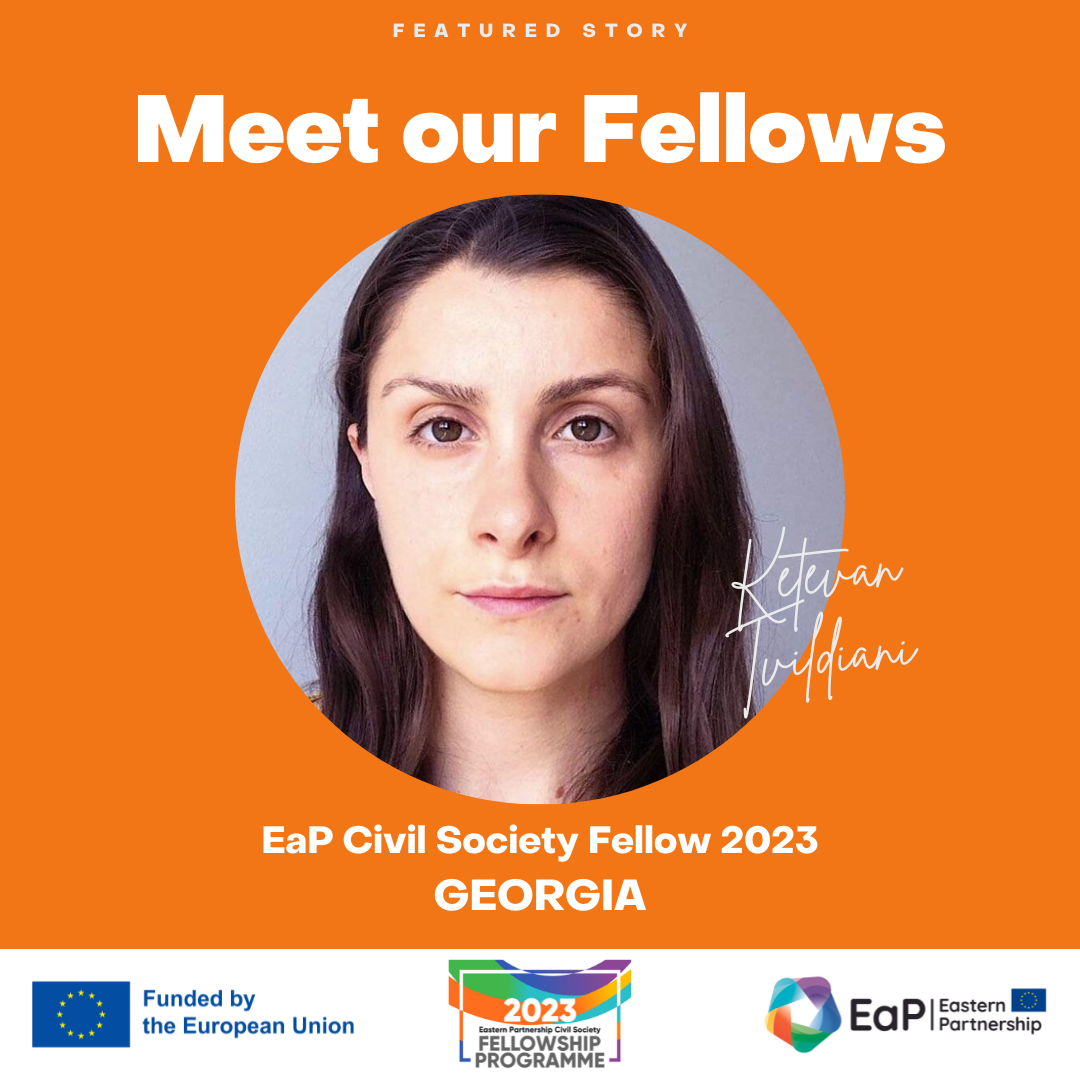To save. To support. To promote. With these three ideas in mind Oleksii Marushchak, a junior researcher at the Schmalhausen Institute of Zoology of National Academy of Sciences of Ukraine and a co-founder of the Ukrainian Nature Conservation Group, applied for the EaP Civil Society Fellowship in spring 2023.
“My main motivation is to help Ukrainian biologists that suffered from the war to save and publish as much data collected by them during their scientific career as possible… In most cases such information remains not published and may be lost forever due to physical destruction… If we teach scientists to work through the Global Biodiversity Information Facility this will be a great contribution to nature conservation in our country”, said Oleksii in his fellowship application.
Oleksii’s application, as well as his profile, stood out from almost 200 concept notes the EaP Civil Society Facility received within that call. Only 28 at that time, he already had been hands-on engaged in protection of nature and biodiversity of Ukraine for good 10 years, both as a scientist authoring more than 170 scientific works, and as an activist, working on the projects to develop Emerald Network and to promote open biodiversity data in Ukraine.
“Biologists become civil society activists when they want to see the results of their knowledge here and now”, explains Oleksii. His journey began at the end of 2014, when he, a bachelor student at the ESC “Institute of Biology” of Taras Shevchenko National University of Kyiv, joined his first project organised by the Nature Conservation Unit as a volunteer. Together with his fellow students, Oleksii traveled to the national parks to help the park managers with daily tasks – and to collect some first-hand data. He remembers that at the end of one of his trips he was approached by a park officer with a request to share his observations of the local amphibians. “I met some amazing professionals in those trips, and communicating with them was very interesting to me as a student; and then you see that your small report did help a national park in its works”, says Oleksii.
Within another volunteer project in 2016 Oleksii found his niche in science and activism – biodiversity data and GIS (Geoinformation System) modelling. “I was given a huge dataset in an excel sheet, some dozens of thousands of records of rare plants and position data,” remembers Oleksii. “I spent a month matching descriptions with finds locations in Donetsk oblast. A couple of years later an atlas of rare plants of Donetsk Oblast was published, with my name as its co-author.” Today he uses biodiversity data to develop scenarios for preserving and managing wildlife.
In 2018 Oleksii co-founded the Ukrainian Nature Conservation Group (UNCG) that now unites more than 50 nature conservation professionals and activists from all over Ukraine. The organisation is a leader in the field of protected areas and contributed to the establishment of 75% of the protected areas created in Ukraine over the past 10 years.
At UNCG Oleksii mostly works on biodiversity data managing and ecological education projects, such as promoting iNaturalist, an app that helps users to identify found animals and plants, and to record the finds into the international biodiversity database. However, he and his colleagues are happy to help those interested in implementing their own projects, from collecting data, evaluating environmental impact, researching a territory and identifying rare species, to training in any nature conservation aspect. Thus, in 2023 the UNCG experts helped Studenukivska hromada create one of regional landscape parks in Kyiv oblast. The CSO also closely worked with the Environment. People. Law organisation to prevent the construction of a wind farm in Polonyna Borzhava, a montane meadow in the Northeastern Carpathians.
Since the beginning of the full-scale war in Ukraine, Oleksii has been helping other scientists, environmentalists and other enthusiasts to save the data on registrations of biodiversity, which can be destroyed by the war. Thanks to him and his colleagues, more than 350,000 of such records were saved, digitalized and published, therefore becoming available for use of scientific community worldwide, and his Fellowship project, ‘Saving Biodiversity Data in Wartime’, has significantly contributed to the process.
Oleksii is modest when he sums up his achievements, “We managed to save some important biodiversity data. We supported the scientists and motivated them to keep their work. And we draw people’s attention to the problems of preserving biodiversity in Ukraine.” However, numbers do not lie. 10+ scientists trained within his project prepared and published 12 datasets on the GBIF platform, having saved more than 20,000 primary biodiversity records for international science, with 20% of the data coming from the occupied or de-occupied territories that suffered from military operations the most. Data from the datasets published within the fellowship project have already been used in 3 international scientific articles. Awareness raising and how-to materials created within the project reached almost 268,000 persons motivating new people to contribute their finds to the GBIF, iNaturalist and other open databases, thus expanding the public knowledge on the state of biodiversity and helping scientists and environmentalists to do their job more effectively and cover much bigger areas that are less accessible in wartimes.
When asked if he had any doubts about saving biodiversity in the middle of the war, Oleksii shrugs his shoulders. As an environmental activist with 10+ years of experience, he knows there is “never the right time when it comes to nature conservation projects”. And as a scientist, he knows that in the next years, these data will be used to assess and mitigate the environmental impact of the war in Ukraine. “The sooner the world will help us to oust the [Russian] invaders, the sooner we will be able to help our nature.”
Find other Featured Stories of our EaP Civil Society Fellows here.
Background information:
Oleksii Marushchak is one of the Fellows of the Eastern Partnership Civil Society Fellowship programme funded by the European Union. Its main objective is to support civil society activists or civically minded people from Armenia, Azerbaijan, Belarus, Georgia, Moldova and Ukraine who demonstrate a deep commitment to leading positive social change in their communities. The Eastern Partnership Civil Society Fellowship programme has been running since 2017 and today the Fellowship alumni has 200 Fellows from across the six countries of the Eastern Partnership. Details about the Fellows and their Fellowship projects can be found here.



